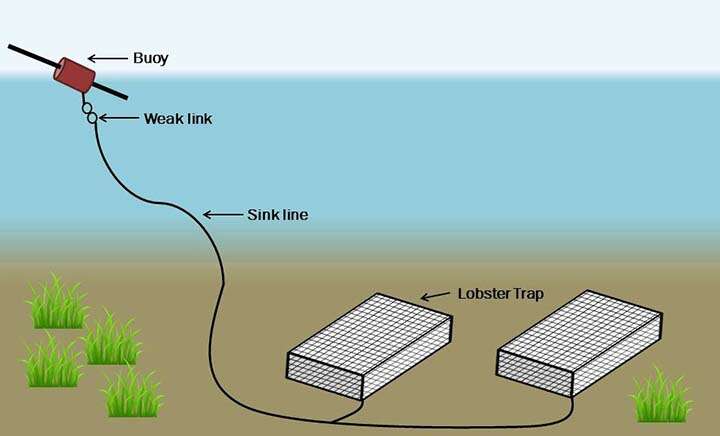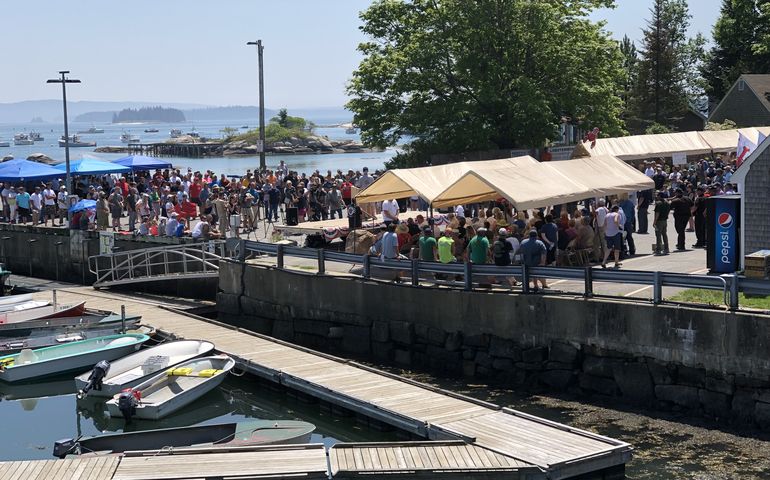
Lobstermen, under pressure from regulations, call for preservation of their livelihood
 Courtesy / Knight Canney Group
Lobstermen and government officials convened at the Stonington Commercial Fish Pier Sunday to call for support of the lobster industry in the face of mounting pressures.
Courtesy / Knight Canney Group
Lobstermen and government officials convened at the Stonington Commercial Fish Pier Sunday to call for support of the lobster industry in the face of mounting pressures.
Lobstermen from Machias to Boothbay Harbor rallied July 21 on the Stonington Commercial Fish Pier to draw greater attention to the issues facing the survival of their industry and the livelihoods of coastal Maine communities.
They were joined by Gov. Janet Mills, three of Maine’s four Congressional delegates and state government representatives.
The rally was convened in response to impending federal regulations that would force lobstermen to withdraw half of their vertical lines from the water column, by reconfiguring their trap gear.
A vertical line is the rope that connects a trap or a string of traps to an identifying buoy on the water’s surface. Earlier this year, federal regulators proposed the action in order to reduce the incidences of injury and death of the endangered North Atlantic right whale population.
Although there was steady population growth from about 270 right whales in 1990 to about 480 in 2010, a downward trajectory began after that. The trend grew worse with an unprecedented 17 whale deaths, particularly in the Gulf of St. Lawrence snow crab fishery, during 2017.
The situation became more alarming this summer with the discovery of six North Atlantic right whale deaths and one entanglement in the Gulf of St. Lawrence in Canada, according to a National Oceanic and Atmospheric Administration news release. Four deaths were mature females.
But lobster fishermen have pointed out that the deaths are occurring in Canadian waters, not U.S. As a result, they’ve questioned the proposed gear change.
“NOAA knows that not one right whale has been proven to have been entangled in Maine rope in many years and the new proposed regulations would only cause extreme danger to our lobstermen,” the rally’s organizer, lobster fisherman Julie Eaton, said in a news release.
“We are the first line of protection to the marine mammals of all types and had much rather work on sensible solutions that work for everyone. Between the proposed new regulations for the right whale, a bait shortage and the threat of aquaculture leases that could allow a single person sole use of 1,000 acres of our fishing grounds, these are dark times for Maine's lobstermen. We are hoping that our state and federal politicians will hear our plea and stand by us and our coastal communities.”
With regard to bait, Eaton was referring to a 70% cut in the fishing quota for Atlantic herring, the lobster industry’s preferred bait, made by federal regulators this year.
With regard to aquaculture leases, she was referring to the Maine Department of Marine Resources recent rejection of a citizens petition that requested a moratorium on aquaculture leases of over 10 acres.

Eaton added that the impacts go beyond individual lobstermen.
“If we can’t make a living then we can’t buy vehicles. We don’t fix our homes, which impacts contractors. We don’t spend as much at the grocery store,” she said. “When a large community such as this with more than 4,800 lobster license holders is impacted the ripple effect will be felt far and wide.”
Gov. Mills has asked Department of Marine Resources Commissioner Patrick Keliher to evaluate a risk reduction target for Maine that is commensurate to risk posed by the lobster industry.
“Maine’s lobster industry is a critical pillar of our state’s economy, with thousands of commercial harvesters and dealers supporting their families, breathing life into their communities, providing jobs, and helping sustain a treasured way of life,” Mills said in the release. “We are committed to pursuing solutions based on sound science that protect both lobstermen and right whales.”
U.S. Sen. Susan Collins, R-Maine, and U.S. Reps. Chellie Pingree, D-Maine 1st District, and Jared Golden, D-Maine 2nd District, attended the rally as well.













1 Comments